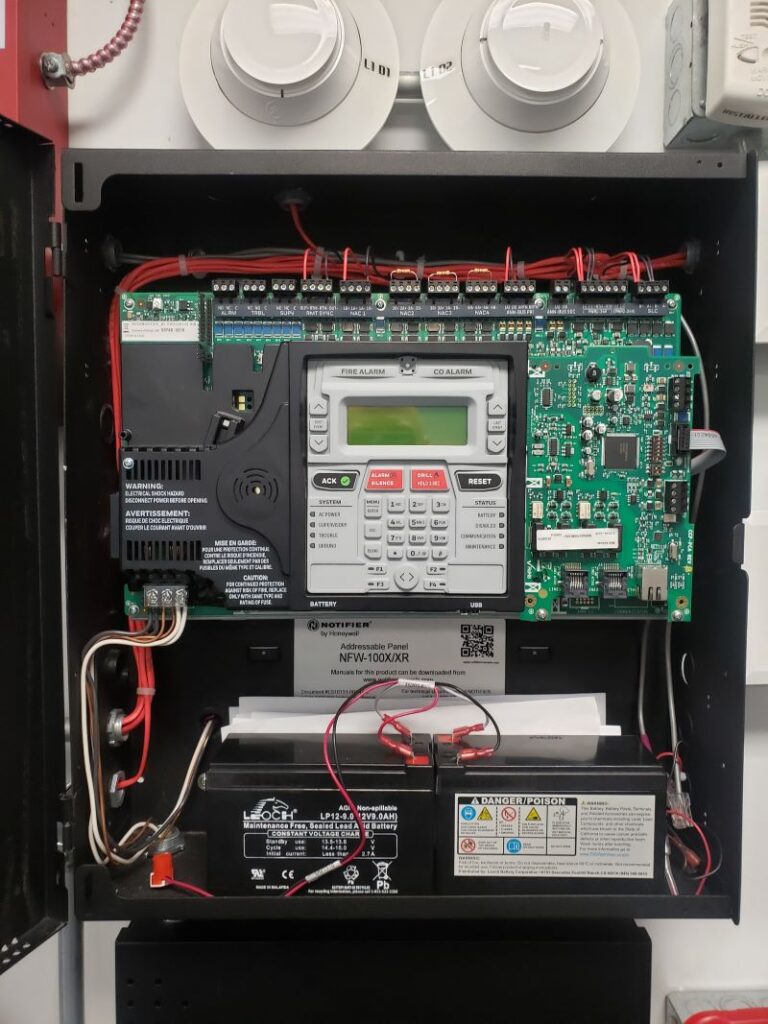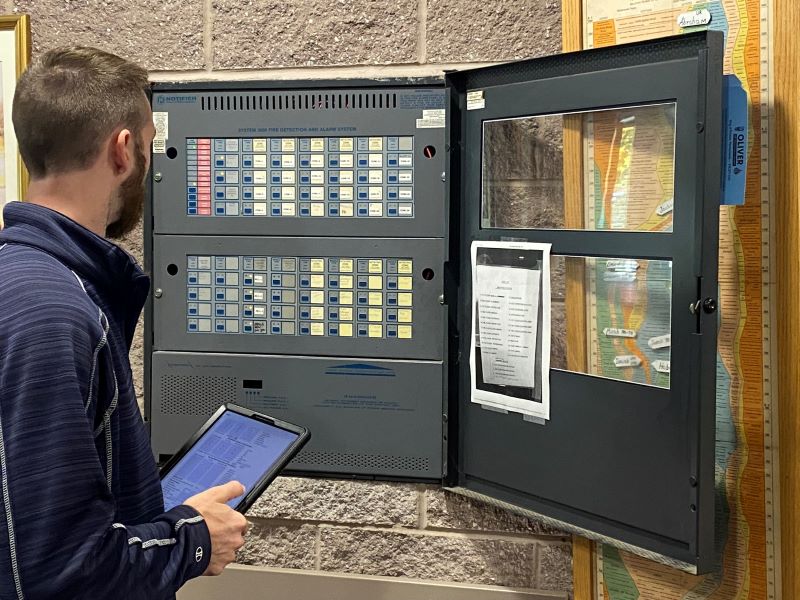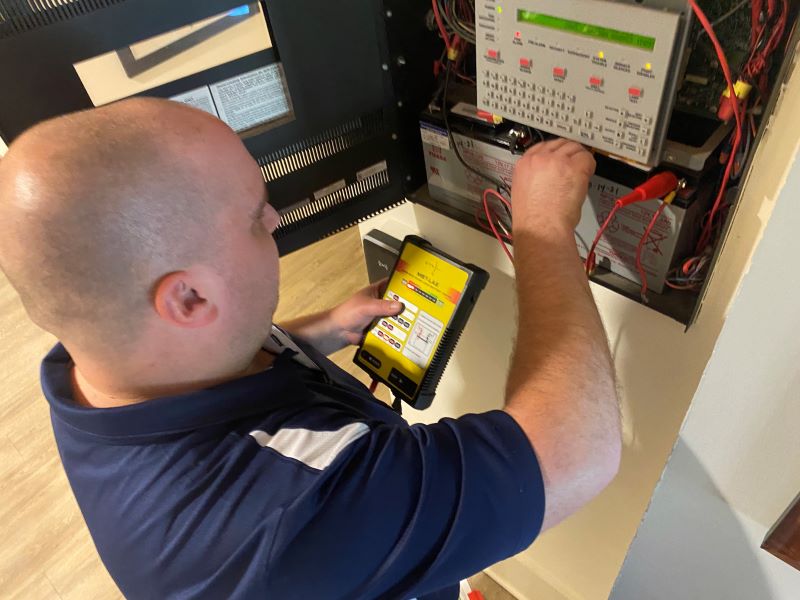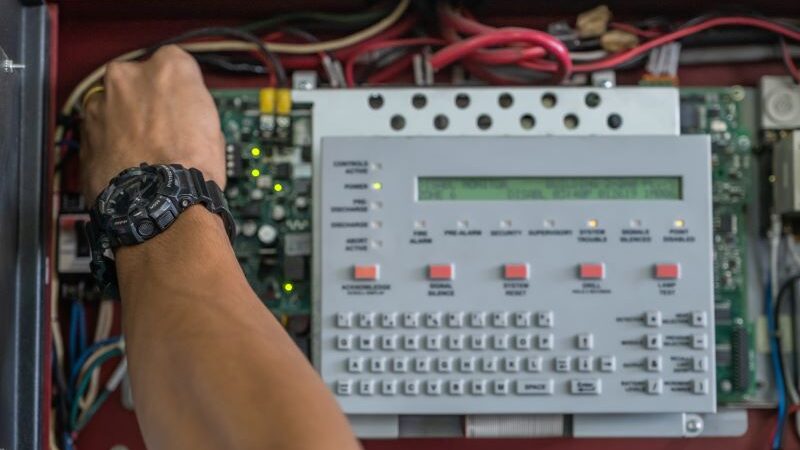Article by Ted Scholl- PMA Specialist
Attention all business owners! The importance of fire alarms cannot be overstated when it comes to protecting your location, your employees, and your assets. In this post, we will delve into the crucial topic of maintaining fire alarms, covering everything you need to know to keep your system in top working condition. From understanding the legal requirements and testing procedures to performing regular maintenance and troubleshooting common issues, we have you covered.
Importance of Fire Alarms in Business Settings
Fire alarms are a crucial component of any business’s safety infrastructure. They serve as an early warning system, allowing employees, customers, and any other present individuals to safely evacuate the premises in the event of a fire. With the potential to save lives and minimize property damage, the presence of effective fire alarms is vital for businesses of all sizes.
Not only does a reliable fire alarm system help protect people and property, but it also ensures that a business is in compliance with safety regulations and codes. Failure to have functioning fire alarms in place can result in legal and financial consequences, making it imperative for businesses to prioritize the installation and maintenance of such systems.
Understanding Fire Alarm Systems

Different Types of Fire Alarm Systems
When it comes to fire alarm systems, there are several different types to consider. The two main categories are conventional and addressable systems. Conventional fire alarm systems use a series of detection devices such as smoke or heat detectors that are connected to a central control panel. Addressable fire alarm systems, on the other hand, are more advanced and capable of pinpointing the exact location of a fire or fault.
Components of a Fire Alarm System
To understand how a fire alarm system works, it is important to be familiar with its components. These typically include detection devices, such as smoke or heat detectors, as well as manual call points, sounders, and control panels. Each component plays a crucial role in detecting and alerting individuals to the presence of a fire, allowing for a rapid and effective response.
Legal Requirements and Regulations for Fire Alarms in Commercial Properties
Understanding the legal requirements and regulations surrounding fire alarm systems in commercial properties is essential for ensuring compliance and the safety of occupants. In most jurisdictions, commercial properties are required to have a properly installed and maintained fire alarm system that complies with specific standards and regulations. This may include regular testing and maintenance, as well as adherence to building codes and local fire safety regulations.
By delving into these aspects of fire alarm systems, individuals can gain a deeper understanding of their importance and functionality, as well as the legal obligations that surround their installation and maintenance. This knowledge is invaluable for property owners and managers, as well as for anyone concerned with the safety and well-being of individuals in commercial spaces.
Regular Maintenance of Fire Alarms

Importance of Regular Maintenance
It cannot be overstated how crucial it is to ensure that fire alarms are regularly maintained. Fire alarms are designed to detect and alert individuals to potential fires, providing essential early warning that can make the difference between a small incident and a devastating fire. Regular maintenance ensures that the fire alarms are in proper working condition, effectively serving their crucial purpose. The consequences of neglecting maintenance can be severe, potentially leading to undetected fires and significant property damage, injury, or loss of life.
Frequency of Maintenance Checks
The frequency of maintenance checks for fire alarms can vary depending on several factors, including the type of system, the environment in which it is installed, and local regulations. Typically, professional inspections are recommended at least once a year to ensure that all components are functioning correctly. However, some systems may require more frequent checks, especially in high-risk environments such as industrial facilities or commercial kitchens. Additionally, regular testing and visual inspections by designated staff can supplement professional maintenance to ensure ongoing functionality.
Qualified Professionals for Maintenance
When it comes to maintaining fire alarms, it is critical to engage qualified professionals with the expertise and training to provide thorough and reliable service. Certified fire alarm technicians possess the necessary knowledge to inspect, test, and repair fire alarm systems effectively. They are also familiar with local regulatory requirements and industry standards, ensuring that the maintenance process complies with all relevant guidelines. By entrusting maintenance to skilled professionals, the integrity and reliability of the fire alarm system can be preserved, promoting safety and peace of mind.
Common Issues with Fire Alarms

Types of Common Malfunctions
Fire alarms are essential for ensuring the safety of a building and its occupants, but they can experience various malfunctions that compromise their effectiveness. Common malfunctions include sensor failures, power supply issues, and false alarms due to dust or smoke buildup. These malfunctions can pose serious risks if not addressed promptly, so it is crucial to be aware of the potential issues and how to troubleshoot them.
Troubleshooting Techniques
When dealing with fire alarm malfunctions, it is important to have a basic understanding of troubleshooting techniques. This may include checking the power source, inspecting the sensors for any damage or obstructions, and verifying the functionality of the alarm system’s control panel. Regular maintenance and testing are also essential to identify and address potential issues before they escalate.
Importance of Addressing Issues Promptly
The importance of addressing fire alarm malfunctions promptly cannot be emphasized enough. Delayed or neglected maintenance can lead to serious consequences, including property damage, injuries, or even loss of life in the event of a fire. By promptly addressing malfunctions and ensuring that the fire alarm system is in proper working condition, you can prevent potential disasters and ensure the safety of the building and its occupants.
Upgrading Fire Alarm Systems
Fire alarm systems are critical components of a building’s safety infrastructure, alerting occupants to potential dangers and enabling a prompt response to emergencies. However, as technology advances and buildings undergo changes, it’s important to consider the need for upgrading fire alarm systems to ensure their effectiveness and reliability. In this section, we will explore the signs that indicate a fire alarm system may need an upgrade, the benefits of upgrading, and the process for carrying out the upgrade.
Signs that a Fire Alarm System Needs an Upgrade
1. Aging equipment: Fire alarm systems, like any technology, have a limited lifespan. If the components of the system are outdated and no longer supported by the manufacturer, it may be time to consider an upgrade.
2. False alarms: Frequent false alarms can be a sign of issues with the system’s sensors or notification devices. An upgrade can address these issues and improve the system’s accuracy.
3. Incompatibility with building changes: If the building layout has been modified or if new equipment or materials have been introduced, the existing fire alarm system may no longer be suitable for the changes. An upgrade can ensure that the system is tailored to the current building configuration.
Benefits of Upgrading
1. Enhanced safety: A modern fire alarm system can offer improved detection and notification capabilities, providing earlier warnings and reducing the risk of injury or property damage in the event of a fire.
2. Compliance with regulations: Building codes and standards for fire alarm systems are frequently updated. Upgrading the system can ensure that it meets current legal requirements and industry best practices.
3. Integration with other systems: Newer fire alarm systems can often be integrated with other building management systems, offering added functionality, and streamlined operation.
Process for Upgrading Fire Alarm Systems
1. Assessment: An initial assessment of the existing fire alarm system should be conducted to identify deficiencies and determine the scope of the upgrade.
2. Design: A comprehensive design for the upgraded system should be developed, taking into account the building layout, occupancy, and specific fire protection needs.
3. Installation: A professional fire alarm contractor should be engaged to carry out the installation of the new system, ensuring that all components are correctly installed and compliant with regulations.
4. Testing and commissioning: Once the new system is installed, thorough testing and commissioning should be conducted to verify its proper functioning and ensure that it meets the required performance standards.
Training and Education

Employee Training for Fire Alarm Procedures
Effective employee training for fire alarm procedures is essential for ensuring the safety of everyone in the workplace. Employees should be educated on how to promptly and properly respond to a fire alarm, including the evacuation procedures, the use of fire extinguishers, and the importance of staying calm during an emergency. Regular fire drill exercises can also help reinforce this training and ensure that employees are well-prepared to handle a fire-related emergency.
Emergency Response Plans
Every business should have a well-defined and comprehensive emergency response plan in place, specifically tailored to address the potential risks and challenges related to fire incidents. This plan should outline the roles and responsibilities of each employee, procedures for reporting and responding to fires, evacuation routes, and designated meeting points. Regular training sessions and drills should be conducted to familiarize employees with the emergency response plan, ensuring that they are well-prepared to take swift and effective action in the event of a fire.
Importance of Fire Safety Education for All Staff
It is crucial for all staff members, regardless of their role or position within the organization, to receive comprehensive fire safety education. This education should cover the fundamentals of fire safety, the potential hazards within the workplace, and best practices for preventing and responding to fires. By equipping all staff members with the knowledge and skills necessary to identify and address fire hazards, businesses can significantly reduce the risk of fire incidents and minimize the potential impact on the safety of employees and the organization’s operations.
By prioritizing employee training for fire alarm procedures, establishing robust emergency response plans, and providing comprehensive fire safety education for all staff, businesses can create a safer working environment and mitigate the risks associated with fire incidents. This proactive approach not only protects the well-being of employees but also safeguards the continuity and resilience of the business in the face of potential fire-related threats.
Maintaining Fire Alarms is a Critical Responsibility for Every Business Owner
By staying informed about the legal requirements, testing procedures, and regular maintenance, you can ensure that your fire alarm system is in optimal working condition. Remember, the safety of your premises, employees, and assets depends on the reliability of your fire alarms. With the knowledge and understanding gained from this blog post, you are now equipped to take proactive steps in maintaining your fire alarms and creating a safer work environment for everyone. Keep your system up to date, conduct regular checks, and address any issues promptly to ensure the effectiveness of your fire alarm system. Your commitment to proper maintenance can make all the difference in saving lives and protecting your business.

